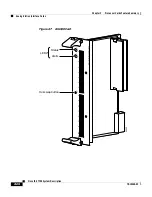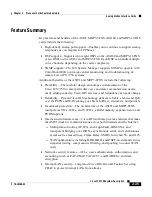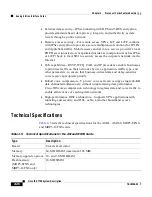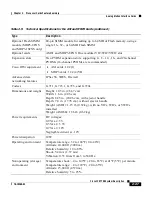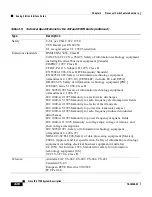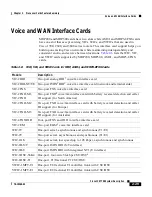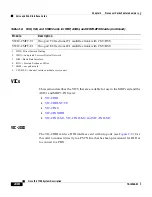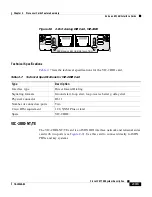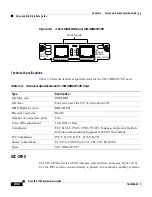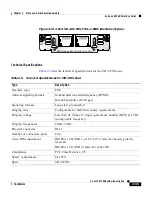
Chapter 2 Processor Cards Feature Summary
Multiservice Route Processor Card
2-18
Cisco ICS 7750 System Description
78-10360-02
Feature Summary
Key features and benefits of the MRP include the following:
•
Digital signal processor (DSP) support—Supports up to ten DSPs; each DSP
can handle multiple voice channels, depending on the codec complexity.
•
Interface cards support—The MRP architecture incorporates VIC, WIC, and
VWIC cards, a RAM memory expansion slot, packet voice data module
(PVDM) slots, and a Virtual Private Network (VPN) module slot.
•
Internet and intranet access—Cisco IOS software features enable the MRP to
communicate across both intranets and the Internet:
–
Multiprotocol routing (IP, Internetwork Packet Exchange [IPX], and
AppleTalk), IBM/SNA, and transparent bridging over ISDN,
asynchronous serial, and synchronous serial such as leased lines, Frame
Relay, Switched Multimegabit Data Service (SMDS), Switched 56, and
X.25
–
WAN optimization, including dial-on-demand routing (DDR),
bandwidth-on-demand (BOD) and Open Shortest Path First
(OSPF)-on-demand circuit, snapshot routing, compression, filtering, and
spoofing
•
Network security features—Access control lists (ACLs), user authentication,
authorization, and accounting (such as Password Authentication
Protocol/Challenge Handshake Authentication Protocol [PAP/CHAP],
, and RADIUS), and data encryption.
•
Internal LAN security—Integrated Cisco IOS Firewall Feature Set uses
context-based access control (CBAC) to protect internal LANs from attacks.
•
External data security—IPSec tunneling with Data Encryption Standard
(DES) and Triple DES (3DES) encryption provide standards-based data
privacy, integrity, and authenticity as data travels through a public network.
•
Remote access security—For remote access VPNs, Layer 2 Forwarding (L2F)
and Layer 2 Tunneling Protocol (L2TP) combine with IP Security (IPSec)
encryption to provide a secure multiprotocol solution (for IP, IPX, and
AppleTalk traffic).
•
QoS capabilities—Resource Reservation Protocol (RSVP), weighted fair
queuing (WFQ), committed access rate (CAR), and IP precedence enable
businesses to prioritize traffic on their networks by user, application, traffic
type, and other parameters.





















